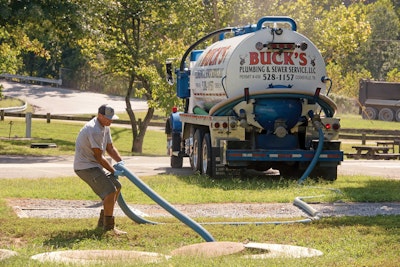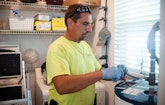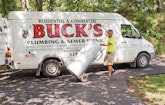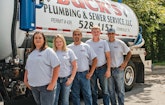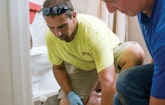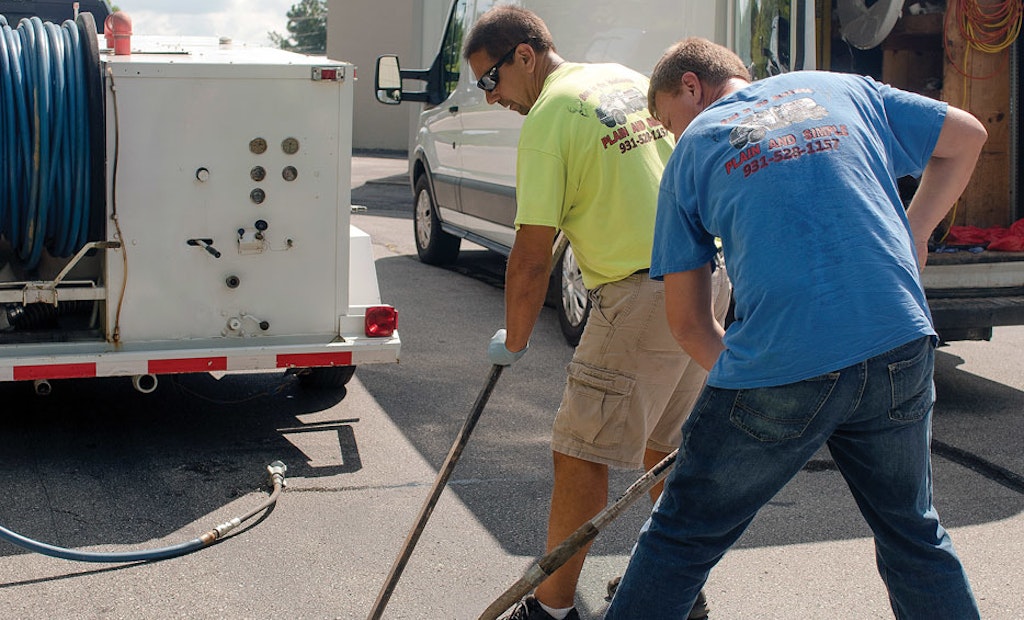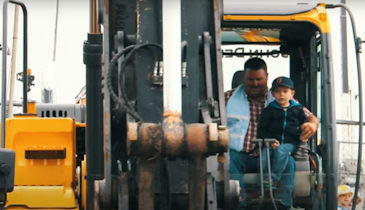Interested in Business?
Get Business articles, news and videos right in your inbox! Sign up now.
Business + Get AlertsIt’s rare that a small business survives past two generations of ownership.
In fact, an estimated 90 percent of third-generation, family-owned businesses are destined to fail. But Shane Buck — the owner of Buck’s Plumbing & Sewer Service in Cookeville, Tennessee — definitely bucks the trend, no pun intended. Since 2011, when he took ownership of the company that has roots dating back to his grandfather, the late Lester Buck, in 1960, revenue has increased 30 percent. Moreover, the company’s roster of productivity- and profitability-enhancing equipment has grown considerably.
The main driver behind that growth should catch the attention of drain cleaning contractors: The acquisition of a local septic tank pumping company, Buckeye Septic Tank, that coincidentally was started by Shane Buck’s great-grandfather, Walter Reed, in 1948. Septic tank pumping, installations, and repairs now account for about 40 percent of the company’s revenue, while service-and-repair plumbing and drain cleaning generate the remaining 40 and 20 percent, respectively.
Another factor behind the company’s growth is the legacy that Buck inherited: a reputation for honest service at a fair price. Buck’s Plumbing is the oldest family-operated company in Cookeville, which is about 80 miles east of Nashville. And should the business ever fail, Buck says it’s not going to happen on his watch.
“I treat customers the way I like to be treated, and that’s why we’re successful,” he says emphatically. “That’s how my grandpa did it and how my dad did it (his father, Jerry Buck, is retired now), so it’s a family tradition. I don’t want our reputation to slip because that’s what has kept us around so long.”
Deep roots
Shane Buck, 43, has been working in the plumbing and drain cleaning industry since he was a child, when he used to help out his dad on jobs after school and then later during summers. “I wasn’t just a ‘runner’ either,” he notes. “He had me doing actual work, to the extent that I could.”
After earning a business degree at Tennessee Tech University in Cookeville in 1999, Buck worked as a full-time lead technician for his father, who had started Buck’s Plumbing in 1973. After Lester Buck died in 1994, Jerry Buck merged Buck’s Plumbing with Cookeville Sewer Service, the company founded in 1960 by Lester Buck. Shane Buck then bought Buck’s Plumbing after his father retired in 2011. “I still get calls from people who were my grandfather’s customers,” Buck says.
At the time, the business owned just two plumbing service trucks and also performed both residential and commercial drain cleaning. But when Buck took control of the company, he also saw an opportunity to expand it at the same time because his great-uncle, Earl Reed, had shut down Buckeye Septic Tank.
“I wanted to keep it in the family,” he says. “You could say it was for both sentimental reasons and the fact it was a good business opportunity. There wasn’t much competition at the time, and we were always getting calls from people anyway, asking if we cleaned septic tanks. But we didn’t have the equipment to do it. I saw good revenue potential, plus we could keep it in the family.”
Buck also was intrigued by the thought of becoming a full-service, one-stop shop that could handle area customers’ drain, plumbing and septic needs. “It all ties together. I wanted a company that could provide enough services that customers wouldn’t have to call multiple businesses to get things fixed. It made sense to me to be able to just do it all.”
Moreover, septic tank owners also need plumbers and drain cleaners, and vice versa, so the businesses easily cross-promote each other. Furthermore, pumping out septic tanks also leads to septic system repairs, not to mention installations when older systems fail, he adds.
How could Buck jump into septic tanks without any experience? First of all, a Buckeye Septic Tank employee stayed on board after Buck bought the company. Second, between watching other people install tanks and taking the classes required to earn a license, he was able to figure it all out. “For installations, a friend of mine helped me out at first,” he explains. “After you do one or two installations, you pretty much know how to do it. Plus I’ve been doing plumbing work since I was 7 or 8 years old.”
Emphasis on diversity
Providing an array of services requires a variety of equipment. On the plumbing and drain cleaning side of the business, Buck’s runs three service vehicles: a 2015 Ford Transit and 2004 and 2008 Dodge Sprinters. Each truck carries drain cleaning machines made by MyTana Mfg., Electric Eel and RIDGID, as well as power tools made by DeWALT Tool and Milwaukee Tool.
The company also owns a leak detection system made by MyTana Mfg., a pipeline inspection camera system made by Amazing Machinery, and a used trailer-mounted water jetter used primarily for commercial work. A Moro USA pump generates pressure of 1,900 psi and flow of 7 gpm.
On the septic pumping side of the business, Buck’s owns four vacuum trucks: a 2001 Kenworth built out by House of Imports with a 4,000-gallon steel tank and a National Vacuum Equipment pump, a 2004 Sterling truck with a 4,000-gallon steel tank and a Jurop/Chandler pump, a 1999 International outfitted with a 2,500-gallon steel tank and a Transway Systems pump, and a 1997 Freightliner self-fabricated by Walter Reed with an 1,800-gallon steel tank and a Moro USA pump.
The company also installs between three and four dozen septic systems a year, Buck says.
By nature of its large tank, the Kenworth pump truck is the fleet’s biggest revenue generator. The large tank minimizes time-consuming disposal runs to waste treatment facilities, which reduces fuel and other expenses and increases productivity. Furthermore, it’s large enough to handle large clusters of septic tanks in state and federally owned parks and campgrounds. “We do their maintenance work, things like cleaning tanks and sewer lines,” Buck says. “It’s not uncommon to pump 30,000 to 50,000 gallons of waste at some of those facilities.”
Employees make the difference
Buck emphasizes that along with good equipment, the company’s employees are critical to its success. His sister, Jamie Fox, serves as the company’s office manager, and his wife, Kim, handles the accounting. Rounding out the staff is Bobby Johnson, septic route driver and plumbing technician Craig Carter, plumbing technician Alex Agostin, and general laborer Brian Blaylock. (Blaylock’s late father, Donnie, used to work for Buck’s father back in the 1990s and also worked for Buck for several years.)
“You’re only as good as your employees,” Buck says. And since good employees are so hard to find these days, he truly values and appreciates their contributions to the company’s growth. While bad employees come and go, the good ones who stay on are invaluable, he notes.
“Two years ago, I went through 13 drivers within a year. They either didn’t show up on time, a couple of them quit, one or two tried to steal from me, and one or two failed drug tests.” Managing such volatile turnover wasn’t easy, he says, “But we had two good employees at the time, and between the three of us, we kept things afloat.”
Between low unemployment and the fact that pumping septic tanks is not a popular job, finding employees is extremely difficult. “If there’s a secret sauce, I’d sure like to know about it,” Buck says.
As such, Buck works anywhere from 65 to 70 hours a week on average and technicians routinely put in 45 to 50 hours a week. “There’s so much work to do,” he says. “Being diversified keeps us busy.” While that’s great for business, Buck says he struggles to find a good work-life balance, like many other small-business owners.
“To get a day off, I literally have to leave town,” he says. “I try to balance things as best I can. But I go to the office around 4:30 a.m. to do bookwork. I try to be home by 5 p.m.; sometimes it works and sometimes it doesn’t. But it has to be done. There are too many families depending on me and this company.”
Eye on the future
Buck anticipates continued growth for the company, but he expects it to come slowly because of how difficult it is to find quality employees. In addition, more growth will eventually require more equipment, which is hard to afford. “I have only so much money to play with to buy equipment,” he says. “That’s why it’s taken me seven years to get where I’m at.”
Plumbing service work is a likely area for growth because Cookeville is a rapidly growing community. In fact, statistics from the U.S. Census Bureau show that the micropolitan area of Cookeville has a population of 111,363 people and ranks eighth among the nation’s fastest-growing micropolitan areas. (A micropolitan area is defined as a labor market centered on an urban area with a population of between 10,000 and 50,000 people; Cookeville’s population is around 33,450 people.)
“There are houses going up left and right around here, so there’s a lot of potential business in the years ahead,” Buck says.
In the end, Buck is determined to keep the family business not just surviving, but thriving. Maintaining the tradition started and carried on by his grandfather and father means everything to him. And better yet, he loves what he does — hard work or not.
“This is all I’ve ever known ever since I started riding around with my dad after school and during summers,” he says. “I like meeting people and solving problems. And if you put those two together, that’s pretty much what we do every day. Sure there are headaches along the way, but you’ve got to love what you do in this business. And I do love it — at least 95 percent of the time.”
Smart equipment purchases make diversifying affordable
Plumber and drain cleaner Shane Buck, the owner of Buck’s Plumbing & Sewer Service in Cookeville, Tennessee, attributes part of his company’s success to its wide variety of good equipment that allows him to serve as a one-stop shop for customers.
But equipment is expensive, which can limit plans for expansion. Buck eases some of that financial strain with an artful combination of investing in used equipment, only buying equipment when he is sure he has enough work to pay it off, and keeping an eye out for great deals.
A good example of the latter is the company’s 2004 Sterling pump truck with a 4,000-gallon steel tank and a pump built by Jurop/Chandler. The truck initially had been repossessed by a bank; Buck found out about it through an advertisement. “At $16,000, it was a steal — just couldn’t pass it up,” he says. “And I only put about $4,000 into it.”
In another instance, he bought a used water jetter from another drain cleaner. “He had two of them and he wanted to get rid of one,” Buck explains. “There again, I pretty much stole that machine. They cost $15,000 to $20,000 new and I bought it for $1,500. And I made my money back the first day I used it.”
In retrospect, however, Buck says he should’ve bought the jetter sooner, a valuable tip for drain cleaners who sometimes are reluctant to make investments in new equipment because of the cost. “After I bought it and saw how much work I can do with it, I realized I should’ve bought one a long time ago,” Buck says. “I passed up a lot of work because I didn’t have the right equipment.”
Buck considers himself a resourceful man, as evidenced by the rebuilt engine on his 1999 International pump truck, which features a 2,500-gallon steel tank and a pump made by Transway Systems. It took him about three months with the help of a relative who is a mechanic.
“That’s how you learn how to do things,” he says. “I’ve always been that way. I’m a hands-on kind of person. Rebuilding that engine taught me a lot about how engines work.” But as the company grew and he had less time to fix things himself, he is tried to strike a better balance between doing things himself and hiring someone to help him out. “I make more money working, so sometimes it’s worth hiring someone to do a job that they’re really good at because they do it all the time.”
